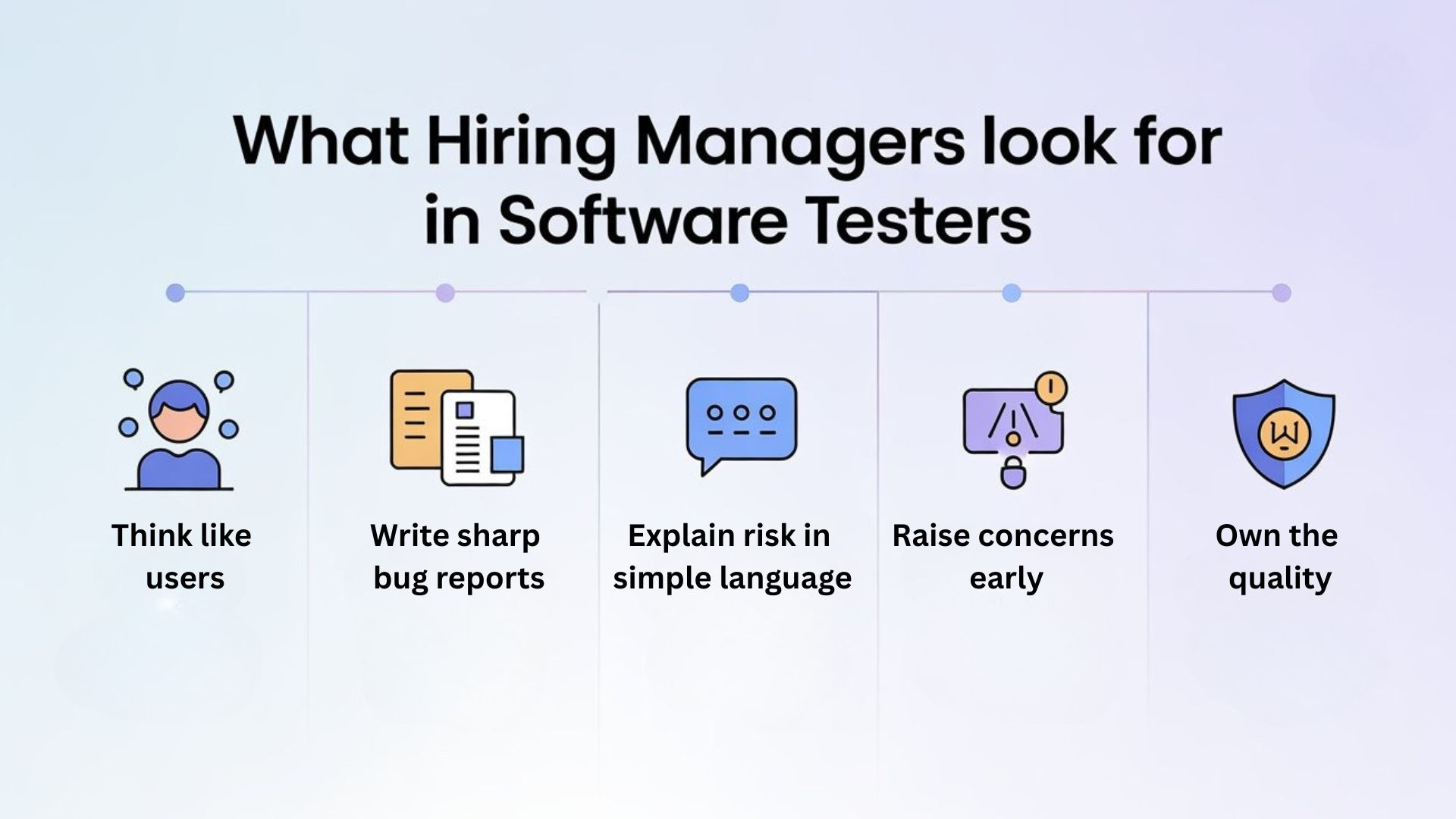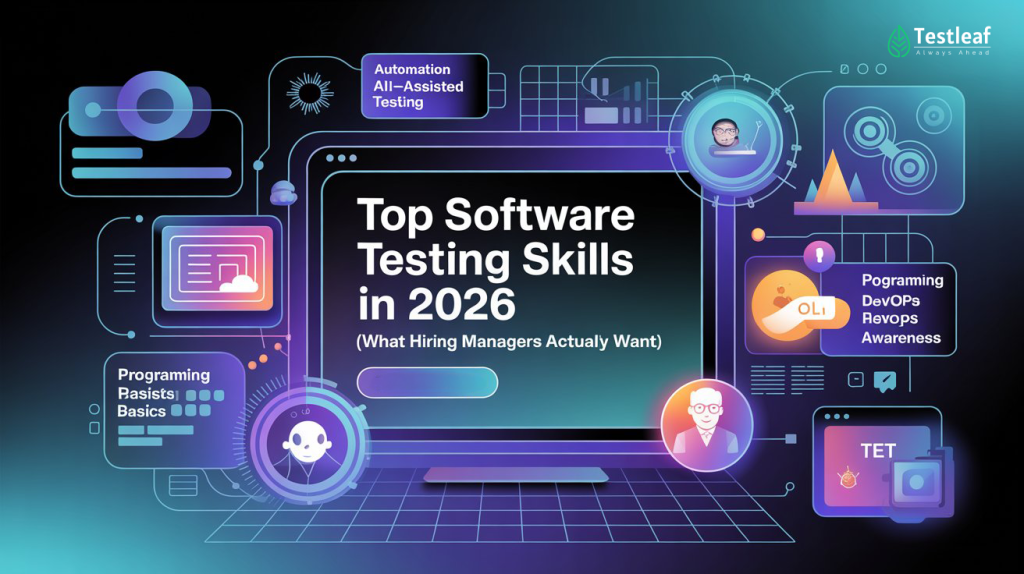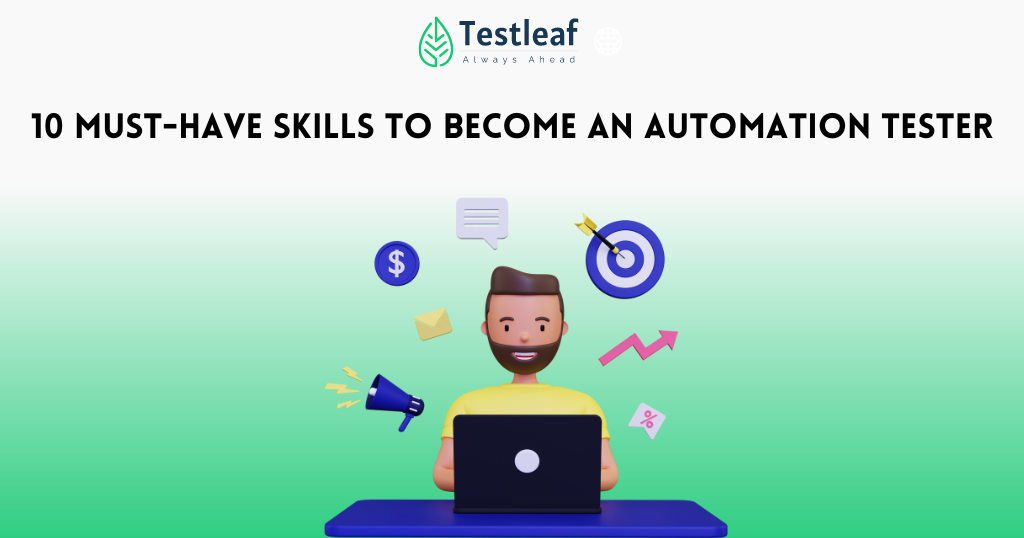In 2026, hiring managers are not asking, “Do you know Selenium?”
They are asking:
“Can this tester help us release faster, with fewer production issues?”
That means tools alone are not enough. You need testing basics, automation, APIs, AI, DevOps awareness, and strong communication – all working together.
This guide breaks down the top software testing skills in 2026 from a hiring manager’s point of view, so you know exactly what to learn and how to prove it.
What Hiring Managers Actually Want
When a hiring manager looks at your profile, they are silently checking:
- Can this person protect our releases?
Will you catch serious bugs before customers do? - Can this person work with our stack?
Web, mobile, APIs, microservices, CI/CD, cloud, AI tools. - Will this person make the team better?
Communicate clearly, own outcomes, and keep learning.
Every skill in this list matters only because it helps answer “yes” to these three questions.
Recommended for You: Epam interview questions
1. Strong testing fundamentals (your core engine)
AI tools can help, but they cannot replace your thinking.
You still need solid foundations in:
- Test design techniques: boundary values, equivalence classes, decision tables
- Writing clear, lean test cases and checklists
- Functional vs non-functional testing
- Risk-based testing: deciding what to test deeply vs lightly
In interviews, you will often get:
- “How would you test this login, checkout, or payment flow?”
- “Tell me about a bug you found that others missed.”
If your answers are structured, logical, and user-focused, you instantly look stronger than someone who only lists tools.
2. Automation and coding (beyond record-and-playback)
By 2026, most good QA roles expect basic programming skills.
Hiring managers look for testers who can:
- Write and read code in Java, Python, or JavaScript
- Use Selenium, Playwright, Cypress or Appium
- Follow page object and reusable component patterns
- Debug failures instead of just re-running the suite
You do not need to be a full-time developer, but you should:
- Use Git for branches and pull requests
- Understand simple OOP concepts
- Keep your test code clean and reviewable
If you are moving from manual to automation and feel lost, a structured software testing course online can give you a clear, step-by-step path instead of random YouTube hopping.
3. API and integration testing (massive green flag)
A lot of business logic now lives in APIs, not only in the UI.
That is why hiring managers love hearing:
“We test our key APIs directly, even before the front-end is ready.”
You stand out when you can:
- Use Postman, REST Assured, or similar tools
- Read API docs / Swagger and ask good questions
- Test status codes, response bodies, headers, timeouts, and errors
- Cover auth, rate limits, and negative flows
- Automate critical API paths and plug them into CI/CD
API skills show that you can test earlier, deeper, and cheaper – exactly what modern teams want.
Explore More: selenium interview questions
4. CI/CD, DevOps awareness and version control
Testing is now part of the delivery pipeline, not a late phase.
In 2026, a strong tester:
- Knows how tests run in CI tools (GitHub Actions, Jenkins, GitLab CI, etc.)
- Reads pipeline logs to see why a stage failed
- Uses Git with confidence
- Thinks in terms of quality gates instead of “I ran tests on my machine”
You sound very mature when you can say:
- “Our smoke suite runs on every pull request.”
- “We fixed flaky tests so the build is trusted again.”
This shows you care about the whole system, not just your local environment.
5. AI in software testing (your new power-up)
AI will not replace testers.
It will replace slow tester workflows.
In 2026, hiring managers are impressed by testers who actively use:
- AI in software testing to generate test ideas, edge cases, and initial test cases
- AI in test automation to suggest locators, refactor code, or analyze flaky failures
- AI for software testing to group similar bugs, summarize logs, and spot patterns
You do not need to build AI models. You need to:
- Write clear prompts (“Generate boundary test cases for this API spec…”)
- Review AI output with a critical eye
- Use AI as a copilot, not as a copy-paste machine
If you want guided practice using AI tools along with manual and automation concepts, an Online software testing course that includes AI modules can give you hands-on experience with real scenarios.
6. Product thinking, communication and ownership
Technical skills get you shortlisted.
Product mindset and communication get you hired.
Hiring managers look for testers who:
- Think like users – “Will this confuse or frustrate a real customer?”
- Write sharp bug reports with impact, not just steps
- Explain risk in simple language to product owners and managers
- Raise concerns early instead of staying silent until release day
- Own the quality of a feature from start to finish

A great tester can say:
- “If this bug goes live, our conversion rate will drop on mobile checkout.”
That is the kind of statement that builds trust with leadership.
Dive Deeper: product based companies in chennai
7. Data, metrics and observability basics
Modern teams expect testers to be at least a little data-aware.
You stand out if you can:
- Track simple quality metrics (defect trends, pass rates, flaky count)
- Use dashboards or reports to guide testing focus
- Read logs and basic traces to support debugging
- Use production signals (crash reports, device stats, real user issues) to improve test coverage
You do not need to be a data engineer. But connecting numbers → decisions makes you look like a partner, not just an executor.
8. How to prove these skills (not just claim them)
Hiring managers trust evidence more than adjectives.
You can show evidence by:
- Hosting a small GitHub repo with UI and API tests
- Bringing a sample test plan, checklist, or mind-map you created
- Sharing anonymised bug reports that show clarity and impact
- Explaining one real example where you used AI or automation to save time or stop a serious bug
These signals tell interviewers, “This person has actually done the work, not just studied theory.”
Conclusion: Turning Skills into a 2026-ready career
The best software testers in 2026 combine:
- Strong testing basics
- Automation and API depth
- CI/CD and AI awareness
- Clear communication, product thinking, and ownership
If you want structured guidance with mentors, peers, and local support, joining a software testing course in chennai can help you turn these skills into real projects, a solid portfolio, and the kind of confidence that hiring managers immediately notice.
FAQs
1. What are the most important software testing skills in 2026?
In 2026, testers need strong fundamentals, automation skills, API testing, CI/CD awareness, AI-assisted testing, product thinking, and clear communication.
2. Do testers need coding skills in 2026?
Yes. Most companies expect basic coding knowledge for UI and API automation with tools like Selenium, Playwright, or Cypress.
3. Why is API testing essential for testers now?
Modern applications run on microservices, so API testing helps catch backend issues early—faster and more reliably than UI testing.
4. What AI skills should testers learn?
Test case generation, self-healing scripts, log analysis, and using AI tools to improve coverage and reduce manual effort.
5. How can I prove my software testing skills to employers?
Build a GitHub portfolio, create UI + API automation projects, share test plans, and provide real examples of bugs you’ve found.
We Also Provide Training In:
- Advanced Selenium Training
- Playwright Training
- Gen AI Training
- AWS Training
- REST API Training
- Full Stack Training
- Appium Training
- DevOps Training
- JMeter Performance Training
Author’s Bio:

Content Writer at Testleaf, specializing in SEO-driven content for test automation, software development, and cybersecurity. I turn complex technical topics into clear, engaging stories that educate, inspire, and drive digital transformation.
Ezhirkadhir Raja
Content Writer – Testleaf








